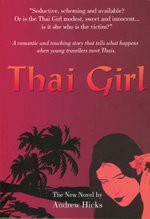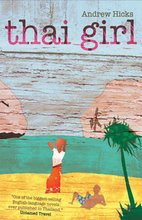
I’m pleased to report that my recent book, “MY THAI GIRL AND I” has sold out and been reprinted already and my novel, “THAI GIRL” has just been reprinted for the seventh time.
I also note in the press that Dan Brown’s plodding novel, “The Da Vinci Code” has sold 51 million copies which is more than the total sales of both my two books together.
It’s taken him six years to crank out a new novel whose name I forget and the first print run is said to be five million copies. Unfortunately, because of storage problems in Bangkok my print runs have to be smaller than that.
On 1st April 2009 I posted on my blog at www.thaigirl2004.blogspot.com a glowing review of my own new novel, “The Kandinsky Lode”, a work in the same god plod genre as all of Brown’s.
The review describes the story of how Desmond Jones, a suburban accountant in southern England is chosen as God’s intermediary on earth to reveal to mankind that Christ’s second coming has already happened. Desmond learns that God has sent his only son to confer upon us the advanced data processing capacity He uses for judgments at the Pearly Gates.
God’s son on earth at last is revealed as none other than Bill Gates, now in philanthropic mode, and the review of course is an April Fool.
On 17 October 2008 in a blog called, ‘Dear John, I’m Confused’ about how often reviews of commercial fiction are utterly ridiculous, I gave some examples from the ‘pseud’s corner’ of quotes on the inside covers of a couple of novels by John Irving and John Grisham.
Like most things where there’s big money sloshing around, the power relationships in publishing are fundamentally corrupt. Reviewers seek to flatter a major author or want to get themselves or their journal quoted and it’s their grovellings that I parody in my spoof review of “The Kandinsky Lode”.
Writing can be a solitary calling and all authors crave feedback. Before the internet it must have been lonely indeed and I’m lucky to have had loads of feedback on both my novel, “Thai Girl” and my new book, “My Thai Girl and I”. They had many reviews in the Bangkok press, mostly positive, but there was sometimes a sub-text I did not always understand.
One reviewer of “Thai Girl” met me for dinner with his photographer, praised the book to the skies and then wrote a review that rubbished it. Happily the magazine’s publisher distanced himself from the review in the next issue and the reviewer no longer had a job, but it alerted me to the strange world of book reviews.
I therefore value more highly the many personal messages I receive, which I always post on the Readers Forum on www.thaigirl2004.com, as these come without any such baggage. Sometimes there are some critical comments but I need these too and they’re all there on the Forum, as well as some positive quotes from the media in the website’s Introduction.
A place I’ve been less well treated has been the members’ forum on www.thaivisa.com. What happens is that somebody asks on the forum what books to read about Thailand, “Thai Girl” gets a mention and then someone else piles in, not with informed criticism but with simple abuse. Things like, “Thai Girl” is the worst novel I’ve ever read,” and “I bet Mr. Hicks has never even been to Koh Pha Ngan”. (Actually the book is set on Koh Samet.)
As their user names are anonymous, they can be as outrageous as they like, but I do wonder why they bother, especially as it’s often clear that they haven’t even read the book. Towards the end of “Thai Girl” there’s a passage where Ben’s backpacker friends slag off Anglo/American foreign policy in Iraq and ridicule the ‘War on Terror” and I wonder if this could have given offence, though even that seems unlikely.
Usually somebody on the forum comes to my rescue and one member, himself an editor and writer, said some very nice things indeed in his post which reassured me on one point.
When I was writing “Thai Girl” I was worried that the plot might be a bit thin. In the story young Englishman, Ben, comes to Thailand and falls for beach masseuse, Fon, has a frustrating time and then flies home again. Nobody gets eaten by sharks or is killed by snakes in a locked Mercedes and there’s not even a tuk tuk chase.
I was thus relieved when my saviour on the forum (after some negative comments about the dialogue) had this to say.
“I read THAI GIRL off the back of a Haruki Murakami book... However, I was quickly drawn into the story and this is where the author's talent really lies: he has a natural gift for narrative. No matter that there's no strong plot… Hicks' raw talent for storytelling keeps the reader turning the pages and this is the prime directive in any kind of writing.
The real heart and soul of this book lies in the character of Fon (the 'Thai girl'). Beautifully observed and drawn, a striking metaphor for Thai culture itself, it is through her that Hicks adeptly explores the central theme of most books of this genre: the difficulty, frustration, pain and, perhaps ultimately, the futility of the foreigner trying to come to terms with the mercurial nature of Thailand. It is to his credit - and I believe displays and reflects the respect he has for this country - that he chose not to use the hackneyed milieu of the Bangkok bar scene as a vehicle to achieve this.”
I was truly grateful to him for so strongly refuting the psychos.
My problem on a public forum like Thaivisa is that I cannot act as my own advocate. If I could, I’d have quoted a brief review posted on www.khaosanroad.com by someone called Anne Merrit. I do not know her from Eve but she’s done what no author can ever do for their own book and that is to sum it up in a few words.
This is what she said about “Thai Girl”, the story of Ben and Fon.
“What comes across as a couple wrapped up in mind games will get you thinking about power games in general, and how gender, age, ethnic and economic differences all factor together. The endlessly complex characters will leave you guessing until the very end. Feminists may find this relationship hard to handle, men who date Thai women may find it instantly relatable. Regardless of your opinions on the falang/Thai romance phenomenon, Hicks’ honest dialogues and relatable themes make this an absorbing read.”
I particularly value criticism of this sort as it’s specific and has no agenda, unlike a few media reviewers and forum critics of the abusive kind. She puts it so well and I couldn’t ask for anything nicer that this, so I’d love to know who she is.
“Thai Girl” was described in a glossy magazine as, “one of the top selling English language novels ever published in Thailand”. I can thus dismiss the psycho critics and my fear that the plot might be a bit thin has long disappeared.
I know he got there first, but it’s reassuring too that William Shakespeare got good reviews for his earlier version of the story.
For that’s pretty much what “Thai Girl” is… a tropical “Romeo and Juliet” without the coffins.
Andrew Hicks The “Thai Girl” Blog April 2009

































